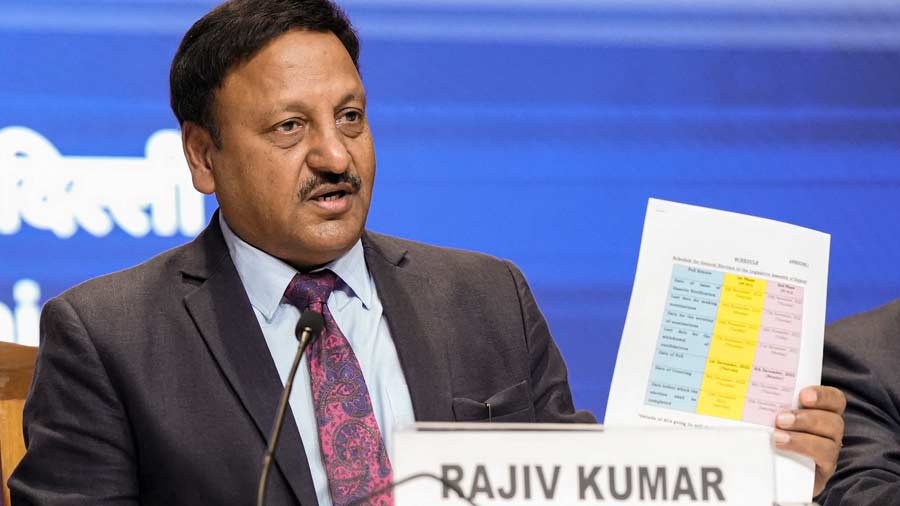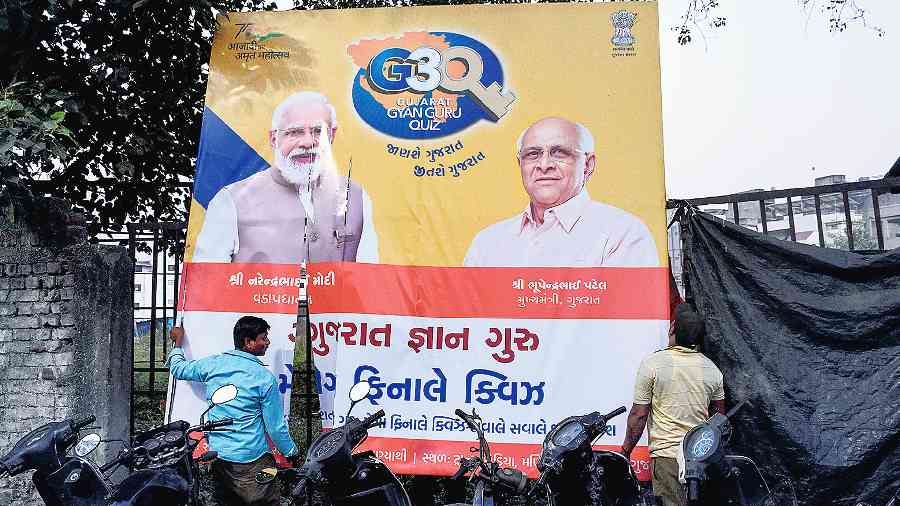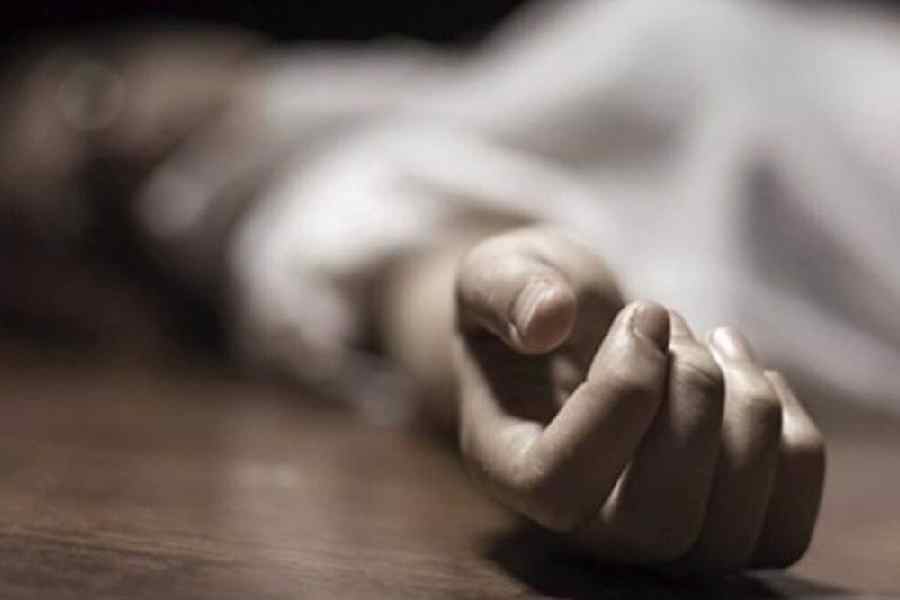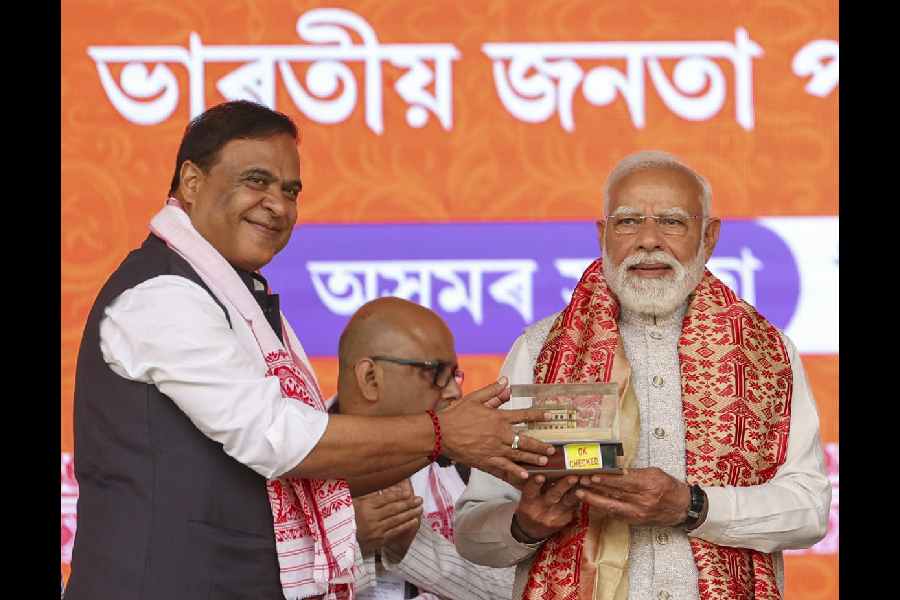The Election Commission on Thursday declared Assembly elections in Gujarat in two phases, December 1 and 5, with counting on December 8, the same day as Himachal Pradesh.
Chief election commissioner Rajiv Kumar defended the poll panel against allegations of bias arising out of its failure to declare elections in the two states together. The Himachal polls, scheduled on November 12, were announced on October 14.
The critics’ argument is that the delayed declaration of the Gujarat elections gave Prime Minister Narendra Modi and the state’s BJP government additional time to announce or inaugurate fresh development and welfare schemes — actions that get banned under the Model Code of Conduct once elections are announced.
Defending the commission, Kumar cited the 2017 precedent (when the poll announcement in Gujarat was delayed to allow flood relief measures), snowfall in Himachal in winter, and the fact of the Gujarat Assembly’s tenure outlasting Himachal’s by 40 days — all of which he had mentioned before — as well as the state mourning in Gujarat on Wednesday in honour of the victims of Sunday’s Morbi bridge collapse.
North and central Gujarat, including the capital Gandhinagar and the big cities of Ahmedabad and Vadodara, will vote on December 5 while the rest of the state, including Surat and Rajkot, will vote on December 1.
Drugs
Kumar, who began by offering his condolences to the Morbi victims, attributed to “various international factors” the “increased” drug trafficking through Gujarat’s ports — a trend the Opposition has flagged to attack the BJP.
The biggest ever narcotics haul in India, worth Rs 21,000 crore, was made in Mundra port last year.
“In the case of Gujarat there is a long coastal border. The Coast Guard has also been instructed to keep a strong vigil on any movement of drugs which is happening, unfortunately… in a very increased fashion because of various international factors,” Kumar said.
On the charge of bias towards the BJP, Kumar said: “Actions and outcomes speak louder than words…. If you say the results are not OK, this is an insult of the Indian voter.”
He referred to how the Election Commission had led a conference of international election bodies — the Cohort on Election Integrity with Mauritius, Greece and the International Foundation of Electoral Systems -- here this week.
“When it comes to the integrity of the election process, India becomes the natural choice and (the) world over our leadership is accepted,” Kumar said.
Promises
He defended the poll panel’s proposed pro forma requiring political parties to explain how their promised welfare schemes would be funded if they are elected to power, a move that came weeks after Modi had derided poll-time sops as “rewri culture”.
Commenting on the objections from the Opposition, and on some former chief election commissioners’ disapproval of the poll panel wading into policy matters with the proposed pro forma, Kumar linked freebies and “populism” to economic stress.
“(The) world over you have a large number of examples in democracies, because of populism and announcements like that there are serious macroeconomic constraints and stresses are visible in these democracies,” he said.
“All parties and candidates have the right to make promises to voters. At the same time, it is also the right of the voters, right of the country, right of the media, right of the experts, right of the academics, right of the economists to know whether the promises being made are the best promises that they deserve and how they can be fulfilled.”
The pro forma will not be introduced in the current polls.
Venues
Kumar highlighted the Suvidha mobile application, in operation since 2019, which helps poll candidates file nominations and obtain permission to use campaign venues.
“For example, booking a ground. It is not at the discretion of district officials. It is first in first out,” he said.
“We have (given) specific instructions for a level playing field. The person who applies for permissions for facilities, grounds, and so on should get it first without any discrimination between political parties.”
A poll panel source clarified that offline permissions from election authorities would continue to be offered as well.
Recently, the commission had rapped the Gujarat government for going slow on the election norm of transferring officers serving in their home districts and those posted at a particular place for more than three years.
The commission highlighted a polling booth set up in a cargo container for 217 voters in Aliabet village, part of Vagra constituency in Bharuch district, where no government building exists.
Nominations for the first phase in Gujarat open on November 5, and for the second phase on November 10.











